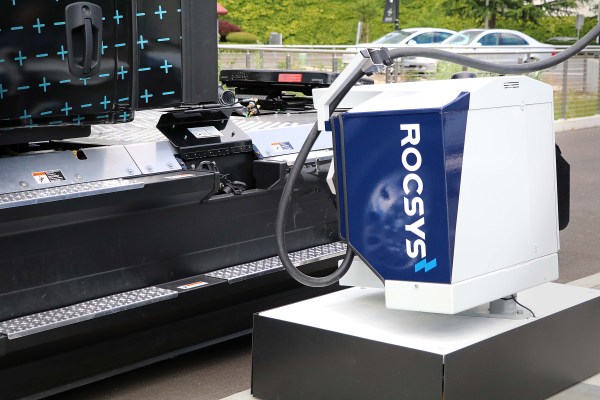America’s logistics sector is becoming more electrified and autonomous, and Rocsys, a Dutch startup, wants to hit that sweet spot in the middle.
Rocsys has created a robotic arm that can transform any electric vehicle charger into an autonomous charger. In yards and ports, where vehicle uptime is crucial and the margin for error is slim, being able to plug in a charger and remove it without manual intervention is not only attractive to logistics operators, but it has a use case today.
“Our solution is crucial in ports because, due to worker regulations, often charging cannot be done by the [truck] drivers,” Crijn Bouman, CEO and co-founder of Rocsys, told TechCrunch. “So in order to electrify fleets, they must automate the charging process.”
Bouman went on to say that automated charging has the potential to ensure regulatory compliance and reduce human exposure to high-voltage equipment.
“At the moment we are working in a waste processing plant in Sweden, and it’s a very dangerous environment, so the driver needs to stay inside the vehicle,” Bouman continued.
Aside from partnerships with companies like electric forklift company Hyster, industrial equipment supplier Taylor Machine Works and port operator SSA Marine, Rocsys claims to have a commercial partnership in the works with one of the largest Big Box retailers in North America.
Rocsys doesn’t intend to stop with heavy duty, industrial logistics. On Tuesday, the startup closed a $36 million Series A made up of half equity and half debt. The funds will help the startup build out its North American division and support R&D into the automotive sector, which would include both mainstream consumer vehicles and self-driving robotaxi fleets.
Bouman is targeting the automakers that are planning to introduce automated valet functionality in the next few years (Tesla already has Auto Park), because he says automated EV charging will go hand-in-hand with that.
“We will set up a dedicated automotive team that’s not focused on selling products today, but is basically ensuring we can support the 2026-2027 wave of vehicles that will support robotic charging,” said Bouman.
Rocsys is part of a charging consortium called ROCIN-ECO, which includes Audi, Porsche, BMW, Ford and Mercedes-Benz, that aims to develop interoperable and standardized robotic fast-charging infrastructure along high-volume European transportation routes.
Fleets of robotaxis and self-driving delivery vehicles may also provide a use case in the future for Rocsys. Bouman says the company is already working with American AV companies that are building out charging hubs to service their fleets.
“The logistics of managing a 50-stall charger with autonomous vehicles is pretty demanding,” said Bouman. “You need a crew for that, and every error costs money.”
Bouman says Rocsys’s solution is a game changer because it can be retrofitted onto any existing current and future charger — whether it’s CCS or NACS or anything in between. The business model is based on a one-time purchase of the robotic equipment plus a recurring services fee.
“Because it’s an AI operating system, we are actually training the system on the customer data generated at the site to get better performance,” said Bouman. “There is API connectivity because all the customers have fleet management systems, so we’re basically also offering all the interfaces to create a completely seamless experience.”
One robot currently costs anywhere from $20,000 to $30,000, with a recurring fee of about $2,000 per year, said Bouman, noting that the next generation model will come in at a much lower price point — around 60% of the current price — and a more compact form factor. The third generation is aiming for a sub-$10,000 price point, available around 2027, when cars with automated driving features begin flooding the market in earnest.
Rocsys’s Series A was led by SEB Greentech Venture Capital, with participation from Graduate Entrepreneur, the European Investment Bank and returning investor Forward.One.
